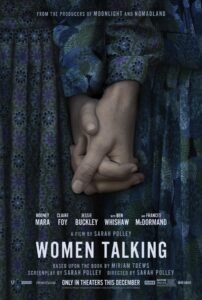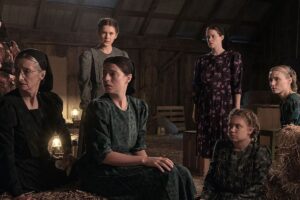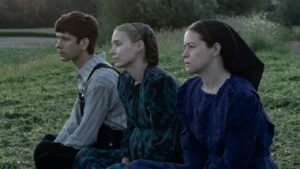 Women Talking. That’s entirely what this movie was. Women talking. A more intelligent person than me would have known ahead of time. However, my decision was based on the months of anticipation surrounding this movie’s Oscar-time release and the outstanding critic (90%) and audience (86%) scores it has received. Women Talking was an all-too-familiar example of a movie receiving a Christmas-time release to be as fresh as possible at the start of the awards season, failing to meet its hype. While a good film, Women Talking offers little originality. Sadly, it isn’t very memorable.
Women Talking. That’s entirely what this movie was. Women talking. A more intelligent person than me would have known ahead of time. However, my decision was based on the months of anticipation surrounding this movie’s Oscar-time release and the outstanding critic (90%) and audience (86%) scores it has received. Women Talking was an all-too-familiar example of a movie receiving a Christmas-time release to be as fresh as possible at the start of the awards season, failing to meet its hype. While a good film, Women Talking offers little originality. Sadly, it isn’t very memorable.
I had high hopes for Women Talking. Unfortunately, most of those went by the wayside, but after about 15 minutes, I realized it would be entirely a dialogue-driven movie. I am certain Miriam Toews’s 2018 novel is captivating, but not all great novels translate successfully when adapted for the screen. Women Talking might have made for a great play. It felt like the play/movie 12 Angry Men but with 12 (actually more) angrier women. While1957 Best Picture nominee remains revered 65 years later, it never felt like more than a good play with really great actors (Henry Fonda, Jack Warden, Martin Balsam, Lee J. Cobb, and Ed Begley all earning at least one Oscar nomination during their careers, while two others earned/won Primetime Emmy awards). Women Talking as a who’s who among Hollywood A-listers, including Rooney Mara (The Girl With the Dragon Tattoo, Carol), Claire Foy (First Man, Unsane), Jessie Buckley (The Lost Daughter, Beast), and Judith Ivey (Flags of Our Fathers, The Devil’s Advocate). Frances McDormand (Fargo, Nomadland) also has acting credit to her name, but her role could be more convincing as she appears in fewer than a handful of scenes and hardly says a word.
The fictional novel is inspired by the 2009 events of the Manitoba Colony. In this eastern Bolivia ultraconservative Mennonite colony, girls and women (the youngest three years old and the oldest 65 years old) were regularly drugged (animal anesthetic sprayed into houses in the middle of the night, rendering all inside unconscious) and sexually assaulted by some of the community men. The community elders dismissed their attacks as ‘imagination’ or attributed them to ghosts or demons. Ultimately, that colony decided they could no longer keep what was happening ‘in-house’ and called the police. Ultimately, eight men were convicted of their heinous crimes.

Women Talking tells the 2010 story of a group of illiterate women living in a remote Mennonite colony subject to physical and sexual abuse by some of the community’s men, who prioritize making women feel inferior. We might not otherwise know what period we are in if not for the movie’s midway point when an outsider slowly drives through the agrarian religious community, blasting “Daydream Believer” by the Monkees while talking into a megaphone that projects “Come out of your home and be counted for the 2010 census!”
One night, one of the women catches her attacker in the act. He is taken away to the local town’s jail. The men of the community travel together to the town, pooling their money to bail him out while encouraging the women to forgive the man by the time they all return (it’s a full day/night out to the town and a full day/night back via horse, buggy, and walking).
While the men are away, the women, who are in disbelief that they are being asked to forgive their perpetrators and thus subjecting themselves to future attacks, decide to assemble in one of the barns and vote on one of three options. Because they can’t read, a drawing heads each of three columns. The women can either do nothing, stay and fight, or leave the community. They secretly vote by making an “X” in the column of their choice. After each woman votes, there is a tie between “stay and fight” or “leave.” As a result, a select counsel headed by Ona (Mara), Salome (Foy), and Mariche (Buckley) meet to discuss the merits and options of each of the other two choices. Their decision will ultimately result in all the women, save a few, such as Scarface Janz (McDormand), who decided to stay regardless of the group’s decision.
The only man remaining is August (Ben Whishaw – Suffragette, Skyfall), a school teacher for the colony boys and the person put in charge of taking the minutes of the women as they discuss the pros and cons of their various options. Still, he establishes the group’s organizing principle or written doctrine more. August’s presence is needed if, for no other reason, none of the women can read or write.

The pros and cons of each choice are labored among the group, and it becomes clear early that the decision is more complex than yes or no. Like with any big decision, each question raises a host of new questions, and often, a woman speaking with conviction at one moment is forced to take a step back, realizing a particular subtext of what she had been in favor of just moments earlier. At times, the pregnant Ona is the calmest and most measured voice, though she can also be the most passionate. Young mothers Salome and Mariche, both victims of male violence, occasionally rage, particularly around how old a son needs to be for him to be allowed to leave with the group. Is it 12? 13? 14? If the decision is to go, what happens if an older son doesn’t want to? If the decision is to stay and fight, what happens if someone who fears for her safety decides not to? There are added layers that come with each what/if scenario.
What was genius about Women Talking is that it takes place in the heart of the origins of the #MeToo movement but that it was in an environment where the women decided they had enough of the sexual abuse they were experiencing was independent of what was happening in a society that had exposure to news outlets. At a time when women (and victimized men, too) were speaking out against their perpetrators in any way they could, the women in this movie were enduring many of the same abuses, all without knowing that there was a massive movement that would have welcomed them, protected them, and given them a platform to speak and act safely.
The media for Women Talking would have been better in book form or as a play than as a movie. It felt very linear and one-dimensional. The performances could have been better, mainly because the storytelling and set design constraints limited each voice. I never felt emotionally tied to these characters, nor did I feel like their ultimate decision hadn’t been decided in the first fifteen minutes.
Women Talking was a miss, especially considering the high expectations I had for it.
Plot 8/10
Character Development 7/10
Character Chemistry 7/10
Acting 8/10
Screenplay 7/10
Directing 8/10
Cinematography 7/10
Sound 8/10
Hook and Reel 7.5/10
Universal Relevance 8/10
74.5%
Movies You Might Like If You Liked This Movie
- She Said
- Promising Young Woman
- Suffragette
- Barbie
- North Country